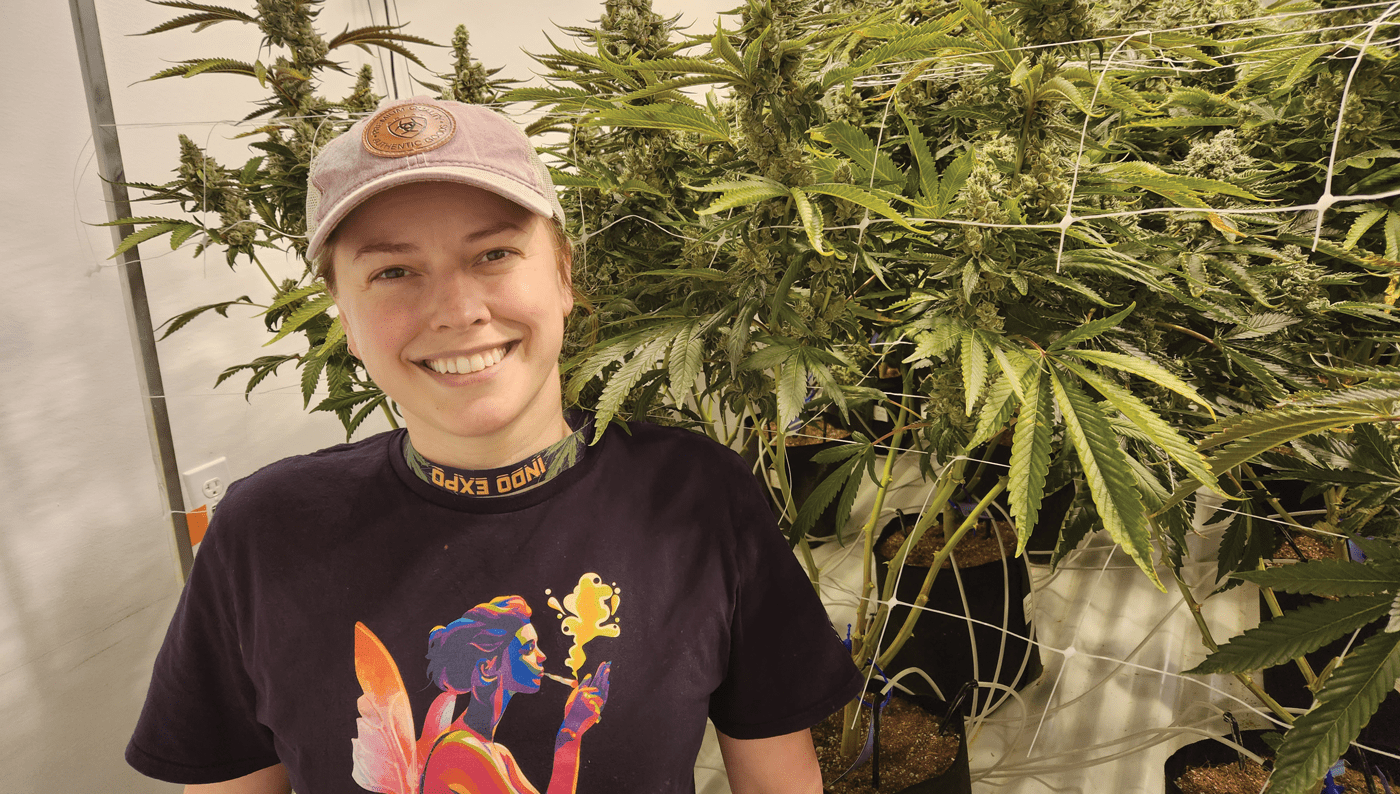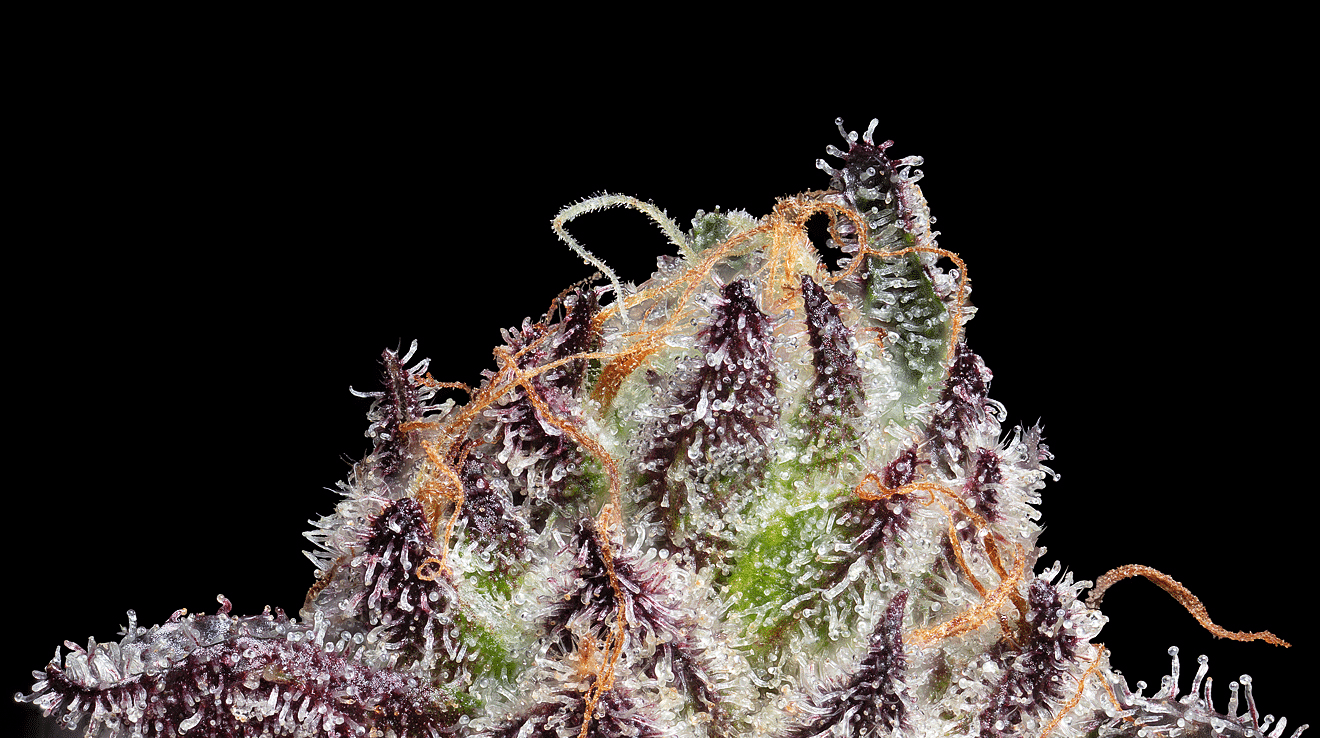Marianne Cursetjee is the CEO and co-founder of Alibi Cannabis, a self-funded, top-shelf cannabis company with a female head grower. Alibi has earned recognition for growing some of the best flower in Oregon. Cursetjee doesn’t have the typical cannabis grower background — for one, she has an MBA. She worked at Microsoft, Intel, and other big name companies with no plan to become a cannabis entrepreneur. She found her way there after developing cancer and having side effects from chemo. She also had to overcome her background of being raised in a conservative Christian home, where cannabis was not part of her early years.
“I worked in finance and accounting for a number of years, then about 20 years ago decided to start my own e-commerce company, before Amazon and all that,” she says. “I ran that for about 10 years, and then sold it and took a couple years off.”
In 2015, she was diagnosed with breast cancer, which changed the course of her life. With helpful support from her husband and children, Cursetjee took a year off from all of her obligations. “Cancer is a horrible disease and I would never wish it on anybody,” she says. “But, what it did was it brought me to a better way of living.”
During her chemo treatment, a friend gave her some RSO, telling her, “try this, it might help.” “I tried it and my mind was completely blown away by how much more effective this plant was than a whole line of pharmaceuticals,” Cursetjee says.

Chemo, of course, is meant to kill cancer cells but it kills non-cancerous cells too. Cursetjee was given “a waterfall of medication,” with a prescription that causes side effects and different prescriptions for the side effects. “The pharmaceuticals are all side-effects based and not actually treating cancer at all,” she says. “By using cannabis, I was able to get rid of all of those medications and focus on what was actually killing cancer.”
When her friend suggested she try cannabis, Cursetjee was open to the idea, although it was not something she had experienced before. As an adult, she had been able to shed the conservative mindset of “going to hell” that she was raised in and realized that there were other ways of living. She says she was fortunate that at the time of the diagnosis, she was in between jobs and looking for other opportunities. Oregon had just legalized. With her new-found belief in cannabis, it seemed like a good industry to get in to. “Everybody should have access to high-quality plant medicine, so we started looking around for property,” she says.
It took a while to buy the 30-acre property she had her eyes on, but they bought it, built the infrastructure, got a license, and started cultivating in 2017. Now, Alibi Cannabis has a Tier II 10,000-square-foot indoor farm in the Portland metro area. Since they’re indoor, they are able to harvest top-tier cannabis every month. “Everything is hand-trimmed and carefully cured,” she says. “We put out the best quality that we possibly can. We are fairly small, but that allows us to truly do craft cultivation at scale. Every plant gets attention.”

Alibi head grower, Lacey Thomas, has a degree in botany and a master’s degree in plant pathology. Growing up in Eugene, Thomas was aware of the strong cannabis culture there and throughout Oregon. Thomas learned to grow when a long-time friend of hers hired her as a cultivator and taught her the ins and outs of commercial-scale cannabis growing. “I took that training and combined it with my plant science education and horticulture knowledge to become the grower I am today,” Thomas says. “I’ve been a recreational consumer of cannabis for a long time and have experience growing small, personal use amounts. And I’ve always just been into plants in general.”
Thomas joined Alibi after growing at another farm where she was the plant health manager. After Cursetjee put out the call for a grower, Thomas reached out and it was a really good fit. “I’m able to do a lot of hands-on cultivation,” Thomas says. “I spend a lot of time learning precision watering techniques. I spend a lot of time looking at graphs and dialing in the environment.”
Thomas uses 1000-watt double ended HPS everywhere except for veg. She grows in coco perlite, and supplements with CO2. Thomas says she enjoys applying her scientific background and education to the production. “My goal is top quality yields on a consistent basis,” she says.
While Alibi’s primary products are flower, they have branched out into gummies, syrups, prerolls, and infused prerolls. Originally, Alibi grew three cultivars, but after three years, the market changed and consumers demanded more. “Now we have about 30 different genetics in our mother room, and we rotate through them,” Cursetjee says. “We try to harvest five strains a month, so that there is enough variety so that people have choices on the shelf, but we also balance that out with amounts that it makes sense to grow because it’s expensive to have a lot of small batches for testing and packaging everything else that goes into it.”
Luckily, Cursetjee’s cancer has gone into remission following her five-year checkup. Does she still feel energized about this line of work, with all of the changes that have happened in the industry in recent years?
“I love it,” she says. “The Oregon market is really, really challenging. A lot of farms and retailers go out of business each year because of oversupply and compressed prices. But we’re in a good place, because we don’t have any outside investors that we have to answer to, and we’re very lean.”
With Cursetjee’s business and finance background, it makes sense that they would have built their system to withstand market effects. If something needs done, everyone on their team chips in without a big hierarchy of people to answer to. While Alibi products can be found in almost 60 locations across Oregon, from Tillamook on the coast to Ontario on the border with Idaho, she’s also excited about opportunities in other states. Alibi is branching out by developing relationships with growers in Massachusetts, and New Jersey, and other states are possible in the future.
All of Alibi’s branding, including a beautiful, sexy woman with butterfly wings, represents their journey. “The reason that we use the ‘Mariposa’ image is because it’s truly an embodiment of what cannabis can bring to the world,” Cursetjee says “It brings out your best self, the inner part of you.”
The word “alibi” typically calls to mind a criminal connotation. But Cursetjee explains that the word actually means that you were somewhere else. She explains: “You can say to yourself, ‘I’ve had a really bad day so I’m gonna go smoke a joint and pretend I’m somewhere else, somewhere better, somewhere where we can all get along, somewhere where there’s truth and honesty,’ whatever it is that you need. I think cannabis brings that. It takes you to that other place that’s not crappy like the world we’re in can sometimes be.”
More information about Alibi is available on their website at alibicannabis.com and on their instagram @alibicannabis



